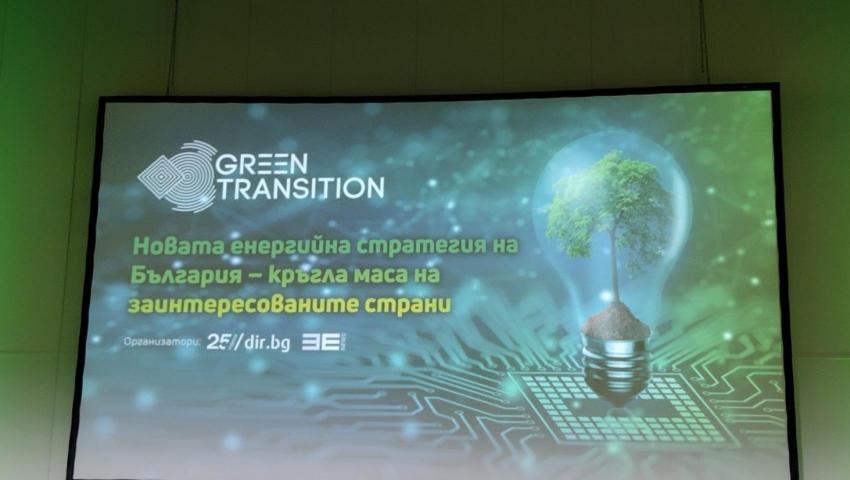Proposal to Parliament: Deputies to organize an institutional discussion on the future Energy Strategy
Within the framework of the GREEN TRANSITION 2023 forum, the main demands of business, science, the non-governmental sector and other interested parties for the development of the sector were synthesized at a special round table

The Speaker of the National Assembly, Rosen Zhelyazkov, to organize an institutional discussion to discuss the pressing topics related to the development of the energy sector in our country. The purpose of the discussion is for the Parliament to provide the framework for the country's future energy strategy, which must be developed and proposed to the National Assembly by the executive. This is what energy policy expert Slavcho Neykov proposed in his letter to the Speaker of the Parliament. The letter was prepared after the active discussion during a round table on the topic "New Energy Strategy of Bulgaria" with the participation of representatives of state institutions, business associations, trade unions, commercial companies, representatives of political parties, national universities, non-governmental organizations, experts. The discussion took place during Green Week 2023 - the largest regional forum for green transformation, innovation and tomorrow's industries, organized by Dir.bg and 3E-news.
The letter summarizes the main problems, proposals and conclusions, presented and defended in an atmosphere of active dialogue and disputes between interested parties, representatives of institutions, businesses and public organizations. The main problem at the moment is the lack of a comprehensive national vision for the development of the Bulgarian energy sector, and this was pointed out by all participants of the forum. This actually has a direct relation to the development not only of energy, but also negatively affects the development of the country's economy. The integrated plan in the field of energy and climate cannot replace the strategic Bulgarian document.
The discussions clearly illustrated the existence of fundamental differences in understanding between business and the state regarding the perception of the financial-economic and legal framework regarding the overall energy policy. The discrepancies are in several main directions - treatment of investors, inadequate financial and economic environment and lack of targeted financing, tax issues and others, the moderator explains in his conclusions.
Bulgaria's new energy strategy should be based on realistic and objective data and modeling. A key element in its preparation are forecast assumptions for energy consumption, energy intensity, investment and energy mix, carbon intensity of the economy - this opinion was widely supported by the participants of the forum.
Given the arguments presented by the round table, institutional deficits are visible at the moment, and one of the options is to specifically discuss the principled proposal for the establishment of an Energy Board. This idea was also launched within the framework of Green Transition 2023, as this could be a long-term and much more flexible formula of an institutional approach, through which to discuss both strategic issues and operational ones aimed at achieving the goals of the future strategy.
The summary also makes it clear that KEVR should be further stabilized and strengthened both from the point of view of composition and from the point of view of independence in its work. The role of EWRC not only for the implementation of the energy strategy, but also within the framework of the Green Transition will only grow and this should be quickly and realistically reported.
The problem of staffing not only the energy sector, but also the activities related to the Green Transition in its entirety is also essential. The success of this transition will undoubtedly depend on the availability of a skilled and competent workforce that can effectively implement and integrate new technologies, which are arriving much faster than training. This in itself calls into question not only the efficient operation of market mechanisms, but also energy security, as well as safety for citizens.
That is why a complete policy change is needed in terms of personnel training - this applies with full force to those related to RES, but not only to them. The issue is similar with regard to personnel in the field of nuclear energy and other sources.
In addition to the topic of personnel security, a specifically defined national strategic approach to the development of science in the context of energy changes is also necessary, including the whole variety of related activities, embodying the Green Transition. This also implies long-term targeted funding of scientific activities in the indicated directions, incl. and risky ones, for which it is not necessary to tie the financing to the achievement of specific results.
The summary groups the main highlights of the round table into six points. They are in several main directions:
For the development of RES, it is important to have the right regulatory framework;
The state should have a clear vision for the development of the natural gas and fuel market, together with the gas transmission infrastructure;
In the context of national energy security and decarbonisation, the development of nuclear power remains essential;
The lack of government vision for the development of conventional fuels and biofuels, together with fragmented responsibility, led to a lack of investment in the oil sector;
Clarity is needed on whether and how coal will participate in the country's energy mix going forward;
Bulgaria also needs a National Program for the Prevention of Energy Poverty.
